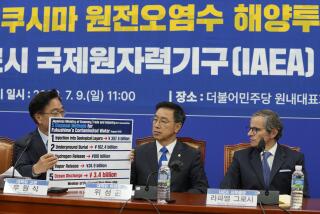Japan’s Farm Trade Proposal Not Enough to Satisy GATT Exporters
- Share via
GENEVA — Japan’s proposal to the 105-nation GATT group for boosting international farm trade was attacked Tuesday by major exporters for not going far enough to open Tokyo’s markets, delegates said.
Yoshio Hatano, Japan’s ambassador, defended his country’s plan and called on exporting nations to phase out their huge subsidies, which he blamed for the crisis in agriculture.
It was the first debate on Tokyo’s blueprint for reforming global agriculture, submitted in late December to the General Agreement on Tariffs and Trade.
The United States, European Community and 14-nation Cairns Group, which includes such major farming nations as Australia, Argentina, Brazil and New Zealand, criticized Japan’s plan during the closed-door meeting of the GATT agriculture negotiating group. The talks end Friday.
“Everyone is disappointed in the Japanese proposal,” a delegate from the 12-nation EC said. “It is unbalanced--it represents only the position of net food importers.”
Delegates said several importing nations, including Jamaica and South Korea, supported Tokyo’s proposal.
Japan is under pressure to liberalize its meat, rice and citrus markets during the GATT’s four-year Uruguay Round of talks, launched in September, 1986, to break down trade barriers in 14 areas.
Agricultural trade--plagued by massive surpluses and depressed commodity prices--has been included for the first time in a GATT trade round.
Hatano defended Japan’s proposal, saying importing countries needed to maintain domestic production of basic foodstuffs.
“For Japan, securing a stable supply of food from abroad is equally important as the maintenance of a domestic supply of basic food stuffs,” he said. He blamed government export subsidies for the “confusion and distortion” of international agricultural trade.
Hatano called for export subsidies to be eliminated. The process should begin with a phase-out within five years to bring subsidies back to the level of 1980, he added.
“Unless we have a reliable exports supply, any concession on access to our markets becomes difficult,” a Japanese delegate, who asked not to be named, said in an interview.
Big exporters say this attitude is unfair.
“The Japanese proposal suggests importing countries should have all sorts of exceptions. It’s just not good enough to place all the burden on the shoulders of the exporters,” an Australian delegate said.
There are three other major proposals to reform world agriculture on the GATT negotiating table.
The United States presented an ambitious plan last July that called for ending all agricultural subsidies by the year 2000 and leaving the free market in control.
The EC offered a plan in October that called for major producers to agree on fixed export prices for sugar, cereal and dairy products in a first phase. Many delegates have criticized the plan as offering only short-term measures.
The EC and United States each spend about $25 billion annually on supporting domestic agriculture.
A Cairns Group proposal last October called for ending government subsidies by the year 2000. But unlike the U.S. plan, it urged freezing production and export subsidies by the end of 1988.
More to Read
Sign up for Essential California
The most important California stories and recommendations in your inbox every morning.
You may occasionally receive promotional content from the Los Angeles Times.













